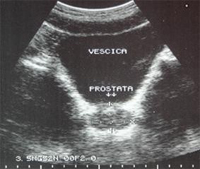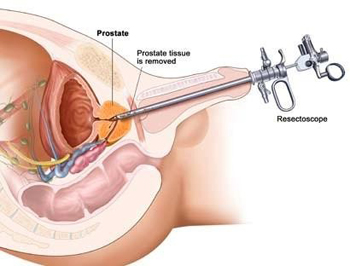Let's recognize and treat prostate diseases early (Part two)
DIAGNOSIS OF BENIGN PROSTATIC HYPERPLASIA

The basic examination to search for a prostate pathology begins with a rectal exploration. In this way, the doctor touches the prostate and thus can initially orient towards a differential diagnosis between BPH, Prostate Carcinoma, or Prostatitis.
In the case of BPH, the prostate is flat, hard, and slightly painful.
Then there are other auxiliary examinations to obtain more accurate diagnostic data, among which:
- Suprapubic or transrectal vesical ultrasound;
- Endovenous urography;
- Cystography;
- Dosage of Specific Prostate Antigen (PSA);
- Flowmetry.
- Urinalysis as well as kidney function analysis.
Prostate ultrasound is a non-invasive examination, based on the use of ultrasound waves and is simple. It does not require any special preparation, except the bladder must be full. Through it, the size of the prostate, the eventual presence of the median lobe as well as the post-micturition residual urine are evaluated.
The evaluation of PSA aims to probably exclude a malignant pathology of the prostate. In suspicious cases, a prostate biopsy is required.
At the age of 50, every man should go to the family doctor to assess his prostate even in the absence of clinical signs. In cases where there are family historical data for prostate pathology, direction to the doctor should be made at the age of 40. When the above-mentioned clinical signs appear, the patient should go to the treating doctor or to the urologist even at younger ages.
TREATMENT
Possible treatments depend on the severity of the disease, the size of the adenoma, the age and condition of the patient as well as the experience of the treating doctor (urologist). If a patient presents mild signs, the specialist doctor may advise the patient for annual checks to monitor the prostate gland as well as advise what to do.
Upon the identification of significant symptoms with irritative or obstructive signs, treatment should begin.
Until a few years ago, the doctor had available only medications with questionable efficacy. This was the reason that the only therapeutic possibility was surgical intervention. Currently, the introduction of medications that work well in BPH has opened the possibilities of conservative treatment and surgical interventions have been reduced for forms not treated in due time or for other problems of prostate pathologies.
In cases of irritative disorders, alpha-blocker medications are usually used, which help relax the muscles of the vesicles and thus improve urination activity.
In cases of predominance of obstructive disorders, the medication finasteride is usually used, which is a medication that blocks the effect of Prostate Dihydrotestosterone and thus improves the dimensions of the prostate and discomfort.
Treatment should continue for a long time as well as periodic control every year at the specialist doctor.
The aim of timely medicinal treatment is:
- for the patient to urinate better;
- to not create problems in the bladder or kidneys;
- to improve the quality of life.
In desperate cases or delayed or ineffective medical treatment, surgical intervention remains the only alternative.
Surgical intervention techniques have evolved over time, becoming less aggressive and with fewer complications. A few years ago, among the common surgical treatment techniques was the open method, which involved the total removal of the prostate.
Modern times have made it possible to use a series of less invasive techniques among which the main ones are:
- TURP (Trans-Urethral Resection of the Prostate);
- HOLEP (Holmium Laser Enucleation of the Prostate);
- TUIP (Trans-Urethral Incision of the Prostate);
- TULIP (Trans-Urethral Laser Incision of the Prostate);
- Thermal therapies which are three (TUMT; TUNA; ILC).
 |
| Resectoscope used in the TURP technique. |
Of all these techniques, the most applicable is the TURP technique which is an endoscopic intervention performed between the urethra by means of an instrument called Resectoscope which cuts the prostatic tissue.
Catheterization after the intervention is kept for about 5 days.
If such an intervention is not possible, it should be intervened with the standard procedure of open surgery of prostatectomy.
ADVICE
- Not to drink liquids at least 2 hours before going to sleep (to improve the signs of nocturia).
- To limit or not use alcoholic beverages and coffee (to not irritate the bladder which causes discomfort).
- To do relaxing and breathing exercises to improve the quality of urination.
- Not to use uncontrolled folk medications without consulting with the doctor.
PREVENTIVE MEASURES FOR PROSTATIC HYPERTROPHY
Various studies suggest a diet rich in proteins, use of vegetables, reduction of animal fats and red meat, but these are measures that can only reduce the occurrence of this pathology.
Men, if they feel even the slightest signs and even if they are still in good condition, should not hesitate to go to the specialist doctor, who should help them to feel better as well as to answer all possible doubts that patients may have about their health.
Thank you for the advice you offer us to keep this - worrying diagnosis - under regular control for us older men. I think our doctors are highly professionally trained, and have a very practical - let's call it popular - communicative ability with patients, which makes it clear how the patient with these very delicate symptoms should act. With respect, Luan Malaj, from SICILY,
Sent by LUAN MALAJ, më 27 October 2012 në 01:13
Honored Mr. Malaj! The purpose of these scientific-popular publications is to acquaint and sensitize both the population and the relevant structures, to recognizing and creating conditions for the timely treatment of some diseases with high incidence. I thank you for your evaluation and comment.
With respect, Dr. Viktori
Sent by Viktor Qereshniku, më 27 October 2012 në 08:23
It is a very valuable information congratulations Dr thank you
Sent by ridvan begaj, më 27 February 2013 në 04:25
respect to the Albanian doctors and medicine
Sent by Nik, më 09 June 2013 në 11:08
Much respect for our best doctors
Sent by kena, më 09 July 2013 në 02:44
Dear readers (Mr. Beqaj, Mr. Nik, and Kena)! Of course, I am pleased that you are readers of this medical portal, as I must express my consideration for the evaluations of Albanian medicine in general, as well as for the assessment you show for the information that I have given you.
With respect,
Viktor QERESHNIKU.
Surgeon. Tirana, Albania
Sent by viktor QERESHNIKU , më 10 November 2013 në 12:40
I am pleased that I can learn more about the prostate because I also suffer from this disease. The doctor has advised me to have regular check-ups. Now I am well, but it seems from what I have read that I should contact my doctor for possible treatment. Brotherly greetings
Sent by Rexhep, më 10 January 2014 në 07:02
Congratulations on the work done in this field of medicine, specifically urology. The explanations given in this study are of interest to all patients suffering from prostate issues
Sent by Sylë Tahirsylaj, më 23 April 2014 në 01:27
We congratulate you for the information that you provide us. Can spondylarthrosis affect the creation of a condition similar to the prostate??thank you
Sent by REDIAN, më 25 April 2014 në 05:26
Dear REDAN!
They are two different diseases, but the organism is one whole!
Sent by viktor, më 30 April 2014 në 09:02
Honorable Syle Tahirsylaj!
I congratulate you for being updated with the articles published on Mjeket.al and thank you for the compliment. We try to make it understandable even by non-medical personnel, to understand and prevent or take measures in the early stages of diseases.
With respect. Viktori
Sent by viktor, më 30 April 2014 në 09:07
Hello Dr. Viktori. I read about recognizing and treating prostate diseases early from you, Dr. I became interested because for about a week I have had pain that, as far as I know, could be prostate pain. But when I read the clinical signs, I'm afraid I don't have any of them, although now I will observe this problem more closely. I should mention that I have disc herniation L2 - L4, and a lot of stomach issues even though I have been treated, I still have many problems. No one in my family has had prostate problems. I have had pain for a year in my right testicle, did an ultrasound, and the doctor told me it was due to the hernia and that I needed to be treated for this. I mentioned these for clarification, doctor, I also did an ultrasound of the bladder and prostate, I have this and was treated with paracetamol with 10% hydroxychloroquine and ketoprofen drops (oki) and had no more trouble, I also removed a belt that I wore for my back pain. I'm telling you this to give you an idea of the concern I have and within your possibilities, please give me an opinion on what I should do as soon as possible. Apologies for the inconvenience, I am awaiting a response within your possibilities through email or we can communicate by phone. 066 20 530 30 With respect, P.C
Sent by Petrit Cara, më 06 April 2015 në 07:24
Hello doctor,
May God grant you a long and healthy life.
We are proud of the specialists we have
Sent by haxhi jasharaj, më 08 May 2015 në 10:56
Dear Cara, with the GOOD WILL that I have to give you an Answer regarding what you are asking for, I must inform you that based on the complaints you present, I am sorry but it is not possible to form a clear idea about your diagnosis! Perhaps the treating doctor will inform you better after the consultation. I am currently outside of Albania. With respect, Viktori
Sent by Dr . Viktori - Përgjigje ., më 12 May 2015 në 02:50
Thank you for the medical information you provide for people. Today, maintaining and preserving health requires culture, which one can find in various ways. I am a 56-year-old man. I do not suffer from any kind of illness. I lead a regular life (family, physical exercises, sexual, in terms of eating, etc.). From the symptoms that you mention (for the prostate) I have no concerns. Should I do any analysis or visit a specialist to prevent any future problems? We do not have genetic problems in the family. With respect, Gjergji Dhamo
Sent by gjergji dhamo, më 08 Agust 2015 në 08:42